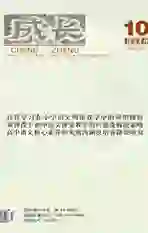Backwash Effects of Formative Assessment in English Teaching and Learning
2017-10-15王淑娟
王淑娟
【Abstract】This article probes into some major research concerning the concepts of formative assessment; analyses the positive backwash effects in English teaching and learning; then discusses some problems occurring in the application of formative assessment and provides some suggested ways to be followed when creating positive backwash effects on teaching and learning.
【Key words】formative assessment; positive backwash; English teaching and learning
Serving as a pivotal component of language teaching and learning, formative assessment aims to improve the teaching and learning of foreign languages by providing teachers and students with immediate and effective feedback. Scientific evaluation system is a crucial requisite to the realization of teaching goals. Previous studies demonstrated that evaluation, teaching and learning are closely interrelated that it is virtually impossible to in work either field without being constantly concern with the other.
I. The Development of Formative Assessment
The term ‘formative evaluation was first coined by Michael Scriven (1967) in response to the improvement of curriculum. Scriven first proposed the term of formative assessment in contrast to summative assessment to demonstrate two different roles that evaluation could serve in curriculum evaluation. In the later years, there was a significant shift in the understanding upon the concept of formative evaluation after Benjamin Bloom and his colleagues (1969; 1971) put forward that the distinction between formative and summative could be used to the evaluation of student learning.
II. Positive Backwash of Formative Assessment on English Teaching and Learning
As an important component of language teaching and learning, positive backwash effects can be observed as follow:
A. Positive backwash on teaching
1. Formative assessment is an effective tool to help aspire students learning motivation. With the increasing and dual pressure of test-orientation, evaluation in English learning is prone to be summative in China. For summative assessment, much more emphasis on learning outcome than process leaves the process of learning little monitored and supported. This is an evaluative method which looks backward, fails to recognize great efforts that students put into learning as well as ignores great changes in behaviors students have during the learning process.
2. Formative assessment is a good device to help students build confidence. Unlike summative assessment, for which whether a student is successful or not lies in the scores achieved, formative assessment proposes ‘a culture of success. This kind of evaluative method gives credit to each student for that everyone has the potential to make it. It aims to offer instructive guides for students to find their own problems of any phase and render effective and concrete assistance to help them solve the problems and make progress.endprint
B. Positive backwash on teaching
Formative assessment has been rendered valuable in teaching instruction by providing teachers with the immediate feedback of their own teaching outcome. It is useful to inform teachers of the existing ‘gap between the actual level of work being evaluated and the required standards. It enables teachers to evaluate the effectiveness of the classroom activities designed as well as the teaching methods and materials he or she is using, and the teaching approach she is adopting.
III. Problems Occurring in the Application of Formative Assessment
The acknowledgment of the beneficial backwash of formative assessment on language teaching and learning has driven widespread use of formative assessment in language teaching. However, some shortcomings claimed of formative assessments occur in its application in English teaching and learning.
1. With respect to students, accustomed to the traditional education philosophy, they have little capacity for self-assessment and self-reflection. Although engaged in the evaluation process, they are not able to make objective and valuable judgments about others work and offer effective and valuable feedback. As a result, it makes no big difference in promoting student learning outcome.
2. Evaluation is a time-consuming process during which teachers have to give written feedback, talk to students face to face and make adjustments in the teaching design. This is a hard task for Chinese teachers for usually over 40 students in each class in senior high. They can not afford too much time on offering concrete and specific feedback to individual student because of exam-oriented and the rising pressure of teaching.
As important classroom determiners, formative assessment is beneficial for both teaching and learning. In the application, some inevitable problems are likely to happen. Effective measures are greatly to be established to create more beneficial backwash in teaching and learning.
References:
[1]Bennett,R.E.(2011).Formative assessment:A critical review.Assessment in Education: Principles, Policy & Practice, 18, 5-25endprint
